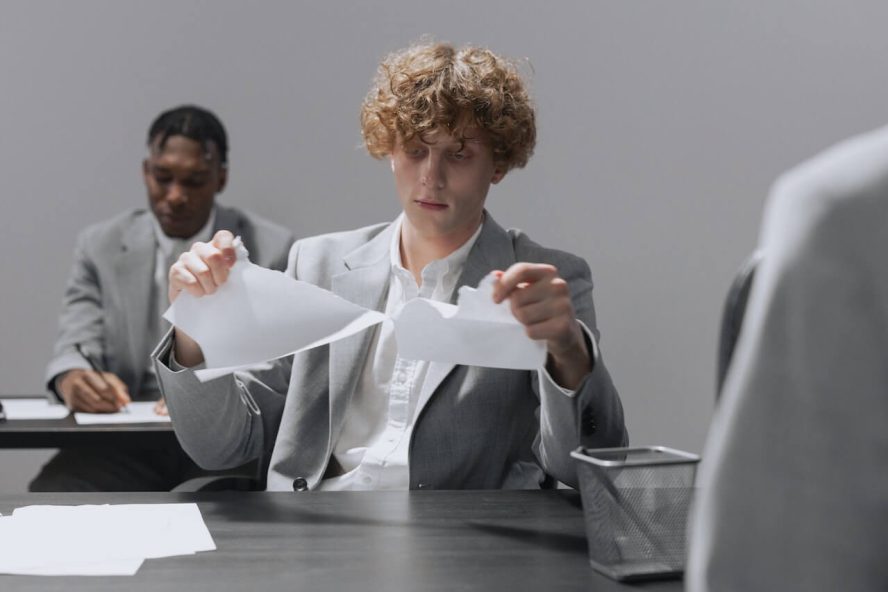A GCSE exam is a big deal for everyone taking them. They require a lot of time and effort to prepare for, and a lot of people work really hard for the tests. However, malpractice is a big situation in an exam hall, and one that is taken very seriously. Your teachers will always go on about this. however, what exactly happens if you get disqualified from a GCSE exam.
If you have been disqualified from a GCSE exam you will receive 0 marks for that exam. However, you may be able to appeal this disqualification if it was unfairly done. If not, you may have the option to re-sit your GCSE exam. In extreme cases being disqualified could affect other exams you have with the same exam board.
In the rest of the article, we will further discuss this, along with the next steps to take, and other reasons why you might be disqualified from GCSE exams, to find out more, you should read on.
Table of Contents
What happens if you get caught cheating in a GCSE exam?
You could only lose a few marks, or only be disqualified for that paper (which could be seen as lucky). This could be if you took in a watch or a calculator for a non-calculator test, or even if you have a mobile phone on you, but they found you didn’t use it.
The next ‘level’ could be disqualification from the whole exam board. This could be if you are caught using your mobile phone or reading notes. This is obviously a huge consequence. A lot of your subjects may be with the same exam board.
Finally, you could be banned from all public exams for a period of time, which could be up to 5 years. As a result, you will not receive your GCSEs, or your A-Levels. This could be if you have sold or passed on ‘leaked’ GCSE papers to a large group.
To find out more about this, you can click here to go to the JCQ page on malpractice.
What happens if you get disqualified from a GCSE exam?
Getting disqualified for cheating is a big deal. The headteacher of your school is required to sign a legal document, pledging that they will enforce any rules set by the exam board, and the Joint Committee for Examinations (JCQ).
Your first problems could be at your school, or your future sixth form/college. When they find out that you have been disqualified from 1 or more GCSE exams, they probably will not be too happy about that. It could lead to a rejection if you have applied there.
Your current secondary school may also put actions on you. This can come in different forms and may be pretty serious, depending on what they decide. To learn more about this, click here to go to the JCQ guide on suspected malpractice.
What are the reasons you could get disqualified from a GCSE exam?
At the beginning of your GCSE exam, you will hear the ‘invigilators announcement’. This will be the rules you must follow.
Breaking any of these could lead to disqualification. This could be wearing a watch, bringing in a phone, notes or books. You could also be disqualified for communicating with other students in the exam hall, even if the exam hasn’t begun, or has finished.
Outside of the exams, distributing or selling ‘leaked’ exam papers is against the rules, and is very severe. If you want to know the rules of the exam hall announced by the invigilators, you can click here to go to JCQs file.
What can you do if you get disqualified from your GCSEs?
The first thing you can do is an appeal (of sorts). If you believe you have been unfairly disqualified, you should get in contact with your school’s exams admin and explain the situation.
If it is quite clear you shouldn’t have been disqualified, then they will be fairly sympathetic. However, if you were blatantly caught cheating this may not be the case.
The exams office could then pass it on to the exam board or make alternative arrangements if they agree with you.
Otherwise, your last option is to do the resits. If you are disqualified from maths or English language, and as a result you didn’t pass, you will be required to retake it by law, and it will be free.
For other subjects, it’s up to you to re-sit. However, if you are in this situation, it will make a huge dent on your calendar, as it may delay your post-16 applications.
To find out how much it costs to re-sit a GCSE, you can click on this link to a Think Student article. Or to find out how many times you can re-sit a GCSE, you click on this link to another Think Student article.
What to do if you fail your GCSEs?
If you have been disqualified from your GCSEs or if you failed, it is never the end of the world! No matter how much your parents, or those around you tell you, you can still work it out.
You should first ask your school or college for help. Many teachers would’ve had students who have been in this situation or may have even been there themselves. They are there to help.
You should also ask yourself about your future career choices. What do you want to do, and what do you need to do to achieve it?
You should also try and find out why this outcome came. Maybe you weren’t motivated or didn’t do as much as you wanted to. Then, you should talk to those around you.
It could be your friends or family. If you want to find out more about the options you have, you can click here for a Think Student article.
